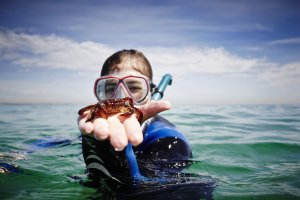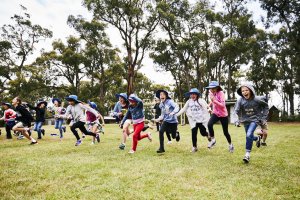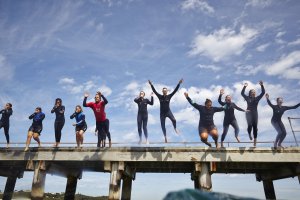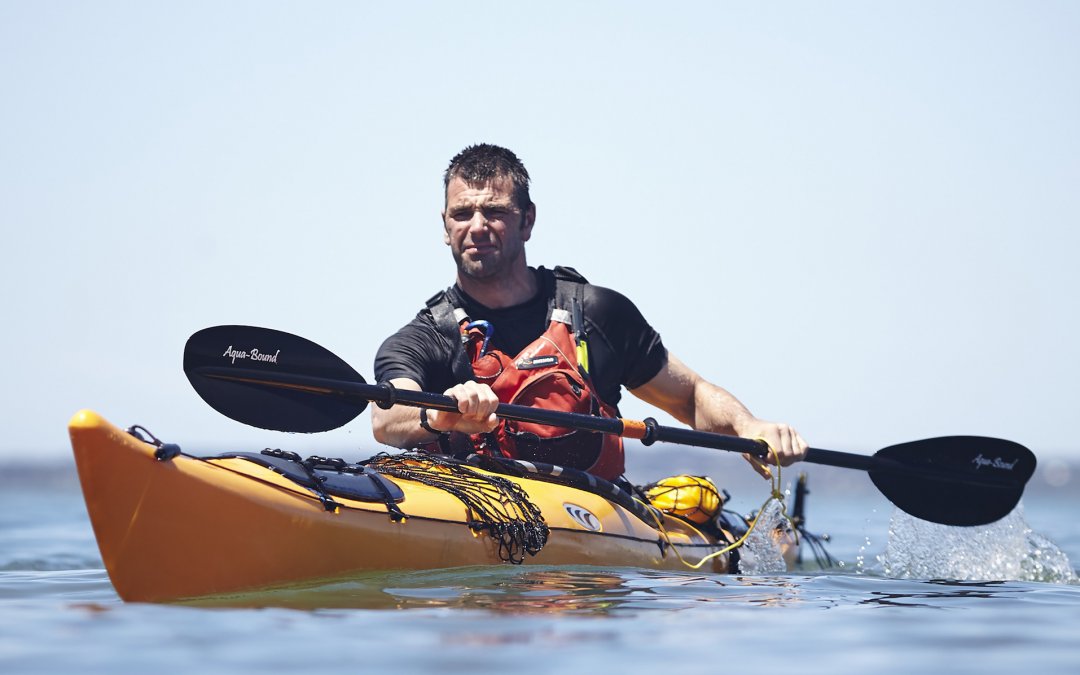WHY WE SHOULD ALL GET OUTDOORS – A Q & A WITH DANIEL MURRAY, DIRECTOR OF UC CAMPING.
Camping has come a long way since the first tent was pitched. Now we have insulated facilities with ensuites, bathrooms and proper kitchens. But one thing hasn’t changed – the joy, comfort and challenge found in Mother Nature’s warm embrace. Just ask Daniel Murray.
Interview by Stephen Acott for Uniting Church Crosslight Magazine
What’s your title?
UC Camping Director.
When did you start this job?
May 2018.
What do you like about it?
I like the fact the church creates opportunities for people to go camping. We encourage and cater for a diverse range of groups. Through bequests and this and that, five per cent of our revenue is dedicated to providing experiences to those who otherwise would not be able to afford it.
UC Camping is one of the most equitable providers in the camping and outdoor education industry.
How many staff do you have?
We have about 25 full-time staff and, depending on the time of the year, up to 60 casuals. This is our most important asset. I am fortunate to have passionate and knowledgeable staff that are regularly identified in feedback as exceptional. I am constantly impressed by their ability to exceed the expectations of our guests.
How many camps do we have?
We have five sites – two in the Grampians (Norval and Acacia), one in Creswick near Ballarat, one at Grantville in west Gippsland and one at Merricks on the Mornington Peninsula. Norval is the largest, with about 180 beds and the smallest is Adekate Lodge in Creswick. It has about 100 beds. All up, we have about 680 beds.
Can you describe the type of accommodation at these sites?
It’s mostly large buildings with small rooms housing two to eight people. Some have ensuites and most beds are bunks. And, of course, there are dining halls, other break-out/meeting rooms and commercial kitchens.
Any chapels?
A couple of the sites do and the others have spaces for worship. Some of the local congregations use the chapels from time to time, but there are no formal services. The chapels are used for many activities, such as craft groups, and people from other faiths use them, too.
Do you have recreational facilities, things like flying foxes, etc?
Depending on the site, there are varying degrees of infrastructure. We have high-rope courses, zip lines, canoeing, swimming pools, archery, mountain biking, snorkelling, among other things. There are also outdoor BBQ areas, fire pits, ovals and sports courts for things like basketball. Most sites have areas for outdoor reflection, like the labyrinth at Grantville.
When did you first get involved with camping?
I trained in outdoor education and have been involved professionally in camping and outdoor education one way or another for the best part of 30 years. My formative experiences were at high school. I was fortunate enough to attend a quite alternative school that had a very strong focus on the outdoors. There was no formal subject or identified outdoor education teacher, but every staff member had a passion outside their subject area that was incorporated into outdoor and co-curricular activities.

How much has it changed in that time?
A lot in some aspects. It’s very infrastructure-focused now, which is a shame. Camping and outdoor education have also become far more formal and structured. The organisations, including schools, that deliver outdoor education and camping experiences are required to meet ever-more demanding risk and compliance standards. Sadly, many of these well-intentioned regulations sanitise the experiences and do not always add to the safety and mitigation of risk. Outdoor education has also become a subject that is offered at VCE.
I have never been an advocate of outdoor education as a subject because it undermines the very essence of being in the outdoors and working together in small temporary communities.
Is there a flip side? Does the fact that outdoor education is now a subject drive students to experience outdoor education where they may not have otherwise?
No, it doesn’t work because it becomes either a compulsory subject at lower levels or an elective subject that is not embedded in a school’s ethos and is only an isolated experience. The students are being led, not leading themselves.
Will we see surfing in classroom as virtual subject?
We’ve got kids who are having led outdoor experiences that are totally inappropriate and, in many cases, putting young people off being in the outdoors for life.
What do you mean?
The adventure activities that the industry run are seen more like an amusement park, where you have to go on “a ride”. Combined with leaders who may not be truly engaged and experienced in the outdoors, young people miss the opportunity for the skilled guidance and leadership that, over time, creates independent and resilient adventurers.
It is a difficult model to challenge and UCC is part of the industry that needs to be challenged occasionally.
Who are the camps primarily for? School groups?
Right now we are what you would call a large-group accommodation provider – groups of 20-plus people – but 50 per cent of our business is schools. The rest is made up of faith-based groups, community groups, special needs groups and family groups.
So if I want to take my family camping, I can’t use your sites?
At the moment no, unless you have a very large family! We do have a number of family camps where the extended family gathers. As of next year, you will be able to book as a small family unit, we just have to get our booking system upgraded.
Just back to school groups, what type of schools usually go and what ages? Primary school? High school?
The biggest users are schools from the independent system, unfortunately. Grades six to nine.
Why do you say “unfortunately”?
Because the harsh reality is, in Victoria at least, privilege seems to beget outdoor education. Even the schools that aren’t classified as “independent”, if you look at where they are located, they are not from low socio-economic areas. The capacity for families whose children attend the local government school to prioritise a school camp over food or power bills is in direct contrast to those who can afford to send their kids to an independent school.

What are the occupancy rates like?
The industry standard is 35 per cent or above and we are about 25 per cent, so there is lots of room for growth and that’s what we are in the middle of trying to do. Our aim is to get to 35-40 per cent in the next five years. Christian Youth Camps are about 40 per cent, same with the YMCA.
We’ve upped our social media presence, we’ve revisited our website (www.uccamping.org.au), given our managers more time to go and see potential clients and are continually upgrading our infrastructure. People now expect motel-like accommodation. “Rustic” is no longer acceptable.
Rustic is not OK? Are we getting softer?
(Laughs) That’s a loaded question! Let’s just say there is a changing expectation in how parents expect their children to be accommodated.
Can you describe the experience I would get if I went to one of the campsites?
You would find very gracious hosts. We spend a lot of time training our staff in the Uniting Church ethos and values. And it’s interesting because many of them are not religious, so when we tell them about our covenanting relationship with the First Peoples and explore our values and ethos they go “actually, this is not a bad organisation” because, at the moment, all they are hearing is the bad stuff that has come to light through the Royal Commission or the more conservative Christian organisations’ views on the LGBTIQ community, same-sex marriage or even the environment.
We go the extra yard and make sure people feel welcome. We get in good staff and deliver good programs. We try to have local staff running our programs so that they genuinely know an area.
When you walk in the Grampians with our Norval program manager Nick Scott or Ant Mair you will be with people who live and know the place. When you go snorkelling with Karen Kirkland, the program manager at Merricks, she can introduce you to the Weedy Sea Dragons by name!
You’ve touched on a really interesting point there. Your camps would be one of the few areas where the Church interacts with people who are predominantly not active churchgoers. Do you think people get a better understanding of the church when they come to these campsites?
That’s certainly something we strive to do, but not in an overt way.
With all the news at the moment about royal commissions into child sexual abuse a lot of institutions are on the nose, particularly institutions of Christian faith.
I go to school briefings and parents ask me if their child is going to be safe, which is very confronting. And parents of other faiths worry that we are going to try to proselytize to their children.
I think what we do well is dispel the myths around Christian organisations. We are an active, safe and accessible interface with the secular community.
I think the institutions, Christian and other, need to demonstrate their credentials to the public – UC Camping can be a very important part of rebuilding trust and a strong relationship with the broader community.
Do you think people get more of a sense of God when they are outdoors, rather than being stuck in a classroom or office?
I don’t think there’s any doubt that the outdoors has a profound effect on people.
People often tell us that the most rewarding experiences they’ve had is where we haven’t programmed an activity, where it’s just free time. For example, at Merricks we have a spot on the beach that’s quite remote and we let the children go and do as they please there and, before they know it, four hours has disappeared.

For many, just sitting and looking at the ocean has been the main activity.
Having time to reflect and sit with yourself would seem to be a spiritual experience whatever faith you subscribe to.
I am not sure I’m qualified to answer the ‘sense of God’ question, but there is definitely a sense of something bigger in the outdoors – inspiring and humbling – not always in equal measure.
Do you run specialised camps?
Yes, in January we had the HeartKids Camp at Granville, which was for kids with congenital heart disease. We’ve just had Brainwave for kids with neurological disorders. Sixty per cent of those camps were funded by the Harold Hughes Estate Bequest.
What does a typical week look like for you?
A lot of travelling. I’m doing about 35,000km a year. I live on the Mornington Peninsula and try to get into the city twice a week. I try to get to every site on a fortnightly basis. I miss the hands-on interaction of running programs. Occasionally the site managers or program managers allow me to work with a group, but they keep a close eye on me!
So that means you are away from home a lot. How does that go down?
I work from home some days to try to compensate and that helps enormously.
When you have holidays, do you go camping?
Yes I do. The kids love it.
Last question: if you found yourself lost in a forest, could you fend for yourself?
(Laughs) I think I’d be happier lost in a forest than dealing with some of the things I have to deal with some days!
You can read this interview directly here.
For further iinformation on how to prepare your child for camp, click here.


Recent Comments